Nowadays, the necessity of the using renewable sources like solar has increased. A solar inverter is a common inverter but uses energy from the sun that is solar energy. This type of inverter aids in changing the DC into AC using solar power. DC is the power which flows in one direction in the circuit and helps in providing current when there is no electricity. Direct current is used for small appliances such as gadgets, iPod, MP3 players, etc. where there is power stored in the battery. In the case of AC (alternative current) is the power that supplies back and forth inside the circuit. Generally, the AC power is used for household appliances.A solar inverter helps many devices that run on DC power to run on AC power so that the operator makes use of the AC power. If you are thinking why to use this inverter as an alternative to the normal electric one, then it is because the solar inverter makes use of the solar energy which is obtainable in ample from the Sun and is clean and also pollution free.
What is a Solar Inverter?
The Solar Inverter is an essential device in any solar power system. Its basic function of the inverter is to change the variable Direct Current output of the solar panels into Alternating Current. The various electrical and electronic components connected in the circuit help in the conversion.
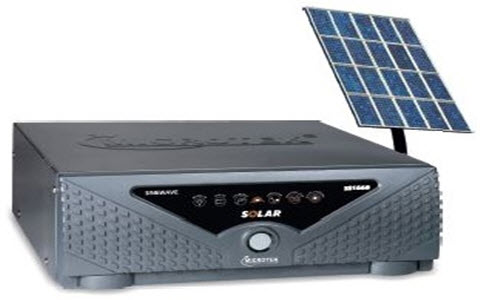
Solar Inverter
The converted Alternating Current power is used for running your appliances like the TV, Refrigerator, Microwave, etc. For some particular applications, we can directly use the Direct Current power from the solar panel such as LED night lights, a cell phone charger. Generally, the power of a home solar power system is used for power AC loads.
Types of Solar Inverters
There are abundant of well-known creators of Solar Inverters all over the world. But there are a few types of solar inverters available in the market which includes the following.
Off Grid Inverters
Off grid inverters are used in remote systems wherein the solar inverter is fed DC power from a battery panel.This battery panel is charged by solar panels.Several such inverters have integrated with basic battery chargers which can be used to boost the battery from an AC power source.
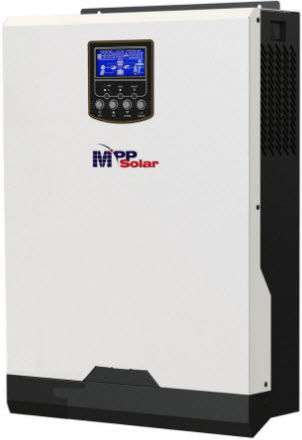
Off Grid Inverter
Grid Tie Inverters
An inverter which is associated with the grid can be said to be a grid tie inverter. These inverter feed power in the electricity grid by corresponding phase and frequency. And, the frequency ranges 50Hz in India and 60Hz in North America of the o/p AC power with the effectiveness supplied AC power. These inverters are designed to automatically shut down once sensing a loss of supply from the utility.
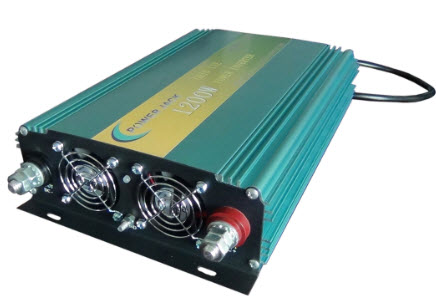
Grid Tie Inverter
Battery backup Inverters
These special types of inverters are particularly designed to draw energy from a battery. The charge of the battery is preserved by using an on-board charger and an additional energy is transferred to the grid. Such inverters have the ability to provide AC power to particular loads during power outages. They also have the anti-islanding function.
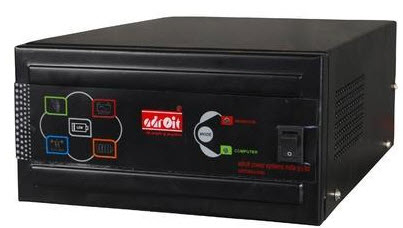
Battery backup Inverter
Micro Inverters
Microinverters are modern in the solar industry. They are small, compact size and portable with a lot of performance. They include all the features of any central inverters.
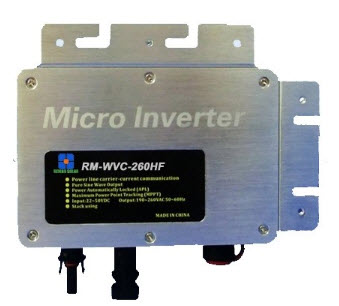
Micro Inverter
Solar Inverter and Its Working
The main goal of this project is to design a system which uses solar energy for household loads using an inverter. The hardware requirements mainly include Bridge-MOSFETs drive, Step up Transformer, Voltage regulator, MOSFET driver, PWM inverter IC, Solar Panel, and Battery.
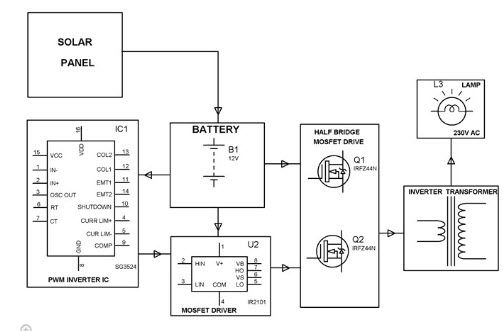
Solar Inverter Block Diagram
Solar energy is changed to electrical energy with the help of photovoltaic cells. This energy is stored in batteries during daytime for the operation purpose whenever needed. The proposed system is designed to utilize solar energy for home loads using an inverter.
A solar inverter converts the DC (Direct Current) output of a PV solar panel into a utility frequency AC (alternating current) that can be fed into a commercial electrical grid (or) used by a local, off-line electrical n/w.
In this proposed system, the solar energy is stored in the battery from PV cells. This energy of the battery is altered to AC supply of 50Hz frequency using PWM inverter IC with MOSFET to the driver MOSFET bridge & step-up the voltage by a transformer, all in off-line n/w only but not grid tie type.
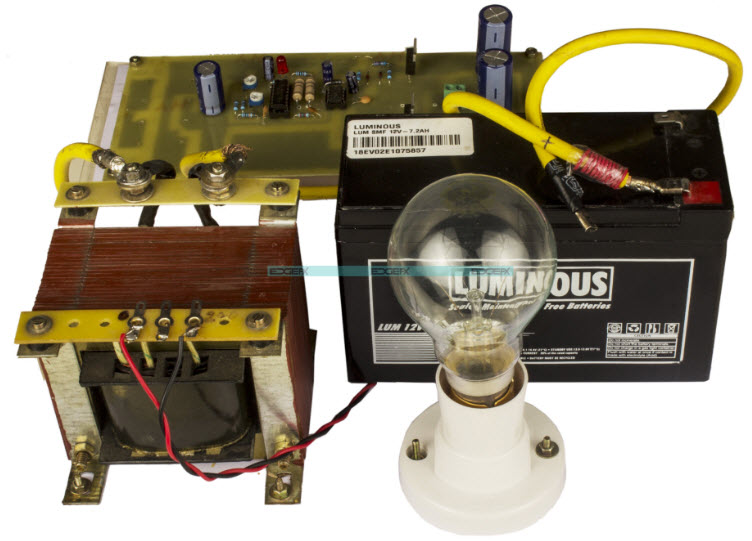
For sample purposes a battery of the SMF kind of and 5 AH (not supplied, it is generally used in small UPS) is necessary to be used as solar cells required would be of very high power type casting very high. Moreover, this project can be added to a charge controller for over voltage, under voltage protection and overload protection.
Please refer to this link to know more about Renewable Energy MCQs
Advantages of Solar Inverter
After knowing in detail what is a solar inverter and how it is a suitable making appliance work at residential & industrial levels we must discuss about the several advantages of the solar inverter.
- Solar energy has constantly helped in decreasing the greenhouse effect and global warming.
- By using of solar based devices will help in saving money and also energy. Because many people have started using these devices.
- A solar inverter helps in changing the DC into batteries or AC. This supports people who use a partial amount of electricity.
- The synchronous solar inverter that helps small homeowners and also power companies as they are huge in size.
- The multifunction solar inverter is the finest among all and works powerfully. It converts the DC to AC very carefully which is suitable for commercial establishments.
- This inverter is cost effective, i.e. low cost than generators.
- Apart from these there are additional devices too, that make use of solar energy such as, solar heater, cooker.
Disadvantages of Solar Inverter
- Primarily, we need to shell out a lot of money for purchasing a solar inverter
- It will work efficiently and produce DC only when the daylight is strong.
- The solar panels are used to attract the sunshine needs lots of space
- Solar Inverters can work when there is no Sunshine but the battery which is available in that is charged fully with the help of Sunshine.
Thus, this is all about solar inverter working, advantages and disadvantages.We hope that you have got a better understanding of this concept or to implement solar inverter project, please give your feedback by commenting in the comment section below. Here is a question for you, what are the advantages of the solar inverter?